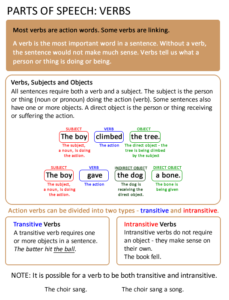Parts of Speech: Verbs
 Most verbs are action words. Some are linking.
Most verbs are action words. Some are linking.
A verb is the most important word in a sentence. Without the verb, the sentence wouldn’t make much sense. The verb tells us what the subject (person or thing) is doing or being.
Verbs, Subjects, and Objects
All sentences require both a subject and a verb. The subject is the person or thing (noun or pronoun) that is doing the action (the verb). Some sentences also have one or more objects. THere are two kinds of objects: direct and indirect. A direct object is the person or thing receiving or suffering the action. An indirect object is a person or thing that is affected by the action.
Objects: Direct or Indirect?
The boy climbed the tree.
In this sentence, the boy is the subject – he is the person doing the action. The action is climbed (past tense of the verb climb). And the direct object is the tree.
The boy gave the dog a bone.
In this sentence, the boy is the subject – he is the person doing the action. The action is gave (past tense of give). There are two objects: the dog, and the bone. To identify which is direct, we need to ask which of them was the action performed upon. The answer is the bone – the bone is the object that was given to the dog. Therefore the bone is the direct object. The object that was affected by the action. The answer is the dog – the dog received the bone. Therefore the dog is the indirect object in this sentence.
Verbs: Transitive, Intransitive, or Linking?
Action verbs can be divided into two types: transitive and intransitive.
Transitive Verbs
A transitive verb requires one or more objects in a sentence. A transitive verb transfers the action from the subject to the direct object. In other words, the object suffers or recieves the action.
Intransitive Verbs
Intransitive verbs do not require an object. They don’t transfer the action at all.
NOTE: Some verbs can be both transitive and intransitive. Look:
The choir sang. (intrasitive)
The choir sang a song. (transitive)
Linking Verbs
A linking verb is a verb that links the subject with an adjective or noun that describes the subject.
They feel cold.
John is a teacher.
